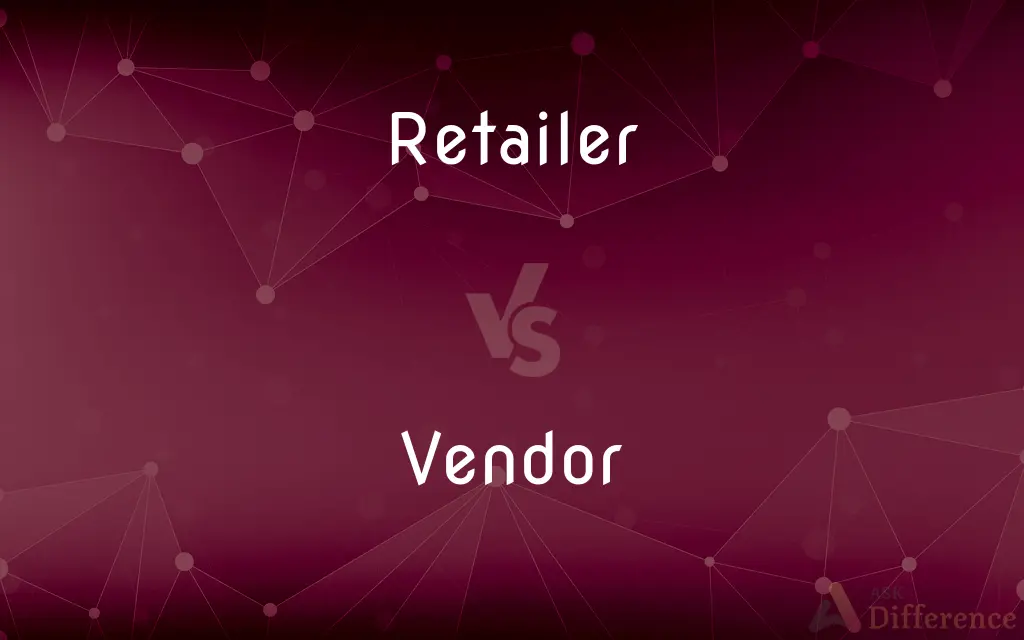Retailer vs. Vendor — What's the Difference?
By Tayyaba Rehman — Updated on September 27, 2023
"A retailer sells goods directly to the consumer, usually in small quantities. A vendor is any entity that sells goods or services, often to businesses, and can include manufacturers and wholesalers."

Difference Between Retailer and Vendor
Table of Contents
ADVERTISEMENT
Key Differences
"Retailer" and "Vendor" are terms that refer to entities involved in the selling of goods and services but represent different stages and roles in the sales process. A retailer is a business or individual that sells goods directly to the consumer. Retailers purchase products from manufacturers or wholesalers and sell them to end-users or consumers, usually in smaller quantities, aiming to earn a profit on the markup. They play a crucial role in the distribution channel by making products available to consumers and providing a platform for product selection and purchase.
Conversely, a vendor is a broad term that refers to any individual or business that sells goods or services. A vendor can be a manufacturer, a wholesaler, or even a retailer, depending on the context. For example, in a business-to-business (B2B) setting, a manufacturer selling products to a retailer is the vendor. In this sense, the term "vendor" is more versatile and can be used to describe any seller in various contexts and levels of the supply chain, not restricted to selling to the end consumer.
In essence, while every retailer can be a vendor, not every vendor is a retailer. Retailers are specifically involved in the business-to-consumer (B2C) market, ensuring that consumers have access to products they need or want. They operate at the end of the supply chain, focusing on selling products to the final user, and are crucial in determining customer preferences and trends.
On the other hand, vendors operate at different levels of the supply chain and can sell to other businesses or directly to consumers. Vendors have a more comprehensive role, encompassing manufacturers, wholesalers, and retailers, and are integral to the movement and availability of goods and services across various markets and industries.
Comparison Chart
Definition
A business or individual selling goods directly to consumers.
An entity selling goods or services.
ADVERTISEMENT
Scope
Primarily operates in the B2C market.
Operates in both B2B and B2C markets.
Scale
Usually sells in smaller quantities.
Can sell in bulk or smaller quantities.
Role in Supply Chain
Operates at the end of the supply chain, interacting with end-users.
Can operate at various levels of the supply chain.
Buyers
Primarily end consumers.
Can be businesses or end consumers.
Compare with Definitions
Retailer
An individual or business that operates stores or e-commerce sites selling to the public.
The retailer experienced a surge in sales during the holiday season.
Vendor
A seller in the supply chain that can be a manufacturer, wholesaler, or retailer.
The vendor offered a bulk discount to attract more buyers.
Retailer
An entity engaged in the business of selling goods to the final consumer.
The retailer ensured that all products on the shelf were of high quality.
Vendor
A business or individual selling products or services, either B2B or B2C.
The vendor maintained a transparent and ethical business relationship with the buyers.
Retailer
A business entity that sells products directly to end consumers.
The retailer offered a significant discount on the new product.
Vendor
An entity providing goods or services to businesses or consumers.
The vendor had a reputation for timely and reliable delivery.
Retailer
A seller in the supply chain that interacts directly with the customers.
The retailer provided excellent customer service, resolving issues promptly.
Vendor
A supplier of goods or services in various markets and industries.
The vendor continuously improved its offerings to stay competitive in the market.
Retailer
A commercial enterprise that purchases goods from manufacturers or wholesalers to sell to consumers.
The retailer stocked a variety of brands to cater to different consumer preferences.
Vendor
In a supply chain, a vendor, or a seller, is an enterprise that contributes goods or services. Generally, a supply chain vendor manufactures inventory/stock items and sells them to the next link in the chain.
Retailer
The sale of goods or commodities in small quantities directly to consumers.
Vendor
A person or company offering something for sale, especially a trader in the street
An Italian ice-cream vendor
Retailer
Of, relating to, or engaged in the sale of goods or commodities at retail.
Vendor
One that sells or vends something
A street vendor.
A vendor of software products on the Web.
Retailer
In retail quantities.
Vendor
One that provides products or services to a business for a fee.
Retailer
At a retail price.
Vendor
A vending machine.
Retailer
To sell in small quantities directly to consumers.
Vendor
A person or a company that vends or sells.
Retailer
(also rĭ-tāl) To tell or repeat (gossip or stories, for example) to others.
Vendor
A vending machine.
Retailer
To sell at retail.
Vendor
To bundle third-party dependencies with the source code for one's own program.
I distributed my application with a vendored copy of Perl so that it wouldn't use the system copies of Perl where it is installed.
Retailer
A retail sales company or salesman.
Vendor
As the software vendor, to bundle one's own, possibly modified version of dependencies with a standard program.
Strawberry Perl contains vendored copies of some CPAN modules, designed to allow them to run on Windows.
Retailer
One who retails anything; as, a retailer of merchandise; a retailer of gossip; - used also of businesses, including large corporations; as, Sears, Roebuck is one the the country's largest retailers.
Vendor
A vender; a seller; the correlative of vendee.
Retailer
A merchant who sells goods at retail
Vendor
Someone who promotes or exchanges goods or services for money
Vendor
Any individual or entity that sells products or services.
The vendor supplied high-quality materials as promised.
Common Curiosities
Who does a retailer buy from?
Retailers typically buy goods from manufacturers or wholesalers.
Can a retailer be a vendor?
Yes, a retailer can be a vendor when selling goods or services to consumers or businesses.
Is every vendor a retailer?
No, not every vendor is a retailer; a vendor can also be a manufacturer or wholesaler.
Does a retailer operate in the B2C market primarily?
Yes, retailers primarily operate in the business-to-consumer (B2C) market.
Can a vendor sell in bulk?
Yes, vendors can sell in bulk, especially those operating in the B2B market.
What does a retailer do?
A retailer sells goods directly to end consumers, usually in smaller quantities.
Is a vendor more versatile in operation than a retailer?
Yes, a vendor has a more versatile role, operating in both B2B and B2C markets.
Share Your Discovery

Previous Comparison
Accomplish vs. Fulfill
Next Comparison
Wombat vs. KangarooAuthor Spotlight
Written by
Tayyaba RehmanTayyaba Rehman is a distinguished writer, currently serving as a primary contributor to askdifference.com. As a researcher in semantics and etymology, Tayyaba's passion for the complexity of languages and their distinctions has found a perfect home on the platform. Tayyaba delves into the intricacies of language, distinguishing between commonly confused words and phrases, thereby providing clarity for readers worldwide.















































